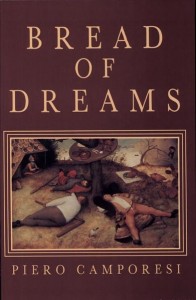Piero Camporesi, Bread of Dreams: food and fantasy in early modern Europe translated from the Italian by David Gentilcore; 1989, Il Pane Selvaggio; 1980.
Bread of Dreams: food and fantasy in early modern Europe by the late Italian historian and cultural anthropologist Piero Camporesi is about desperate (and accepted) forms of nourishment including cannibalism in western Europe in the 16th and 17th century when people lived in a state of almost permanent hallucination drugged by their hunger or bread adultered with hallucinogenic herbs or narcotic seeds, or verminous flour or all manner of fermented drinks.
During the period of the Thirty Years War…when the bark of trees and even dirt was utilized in the desperate hope of prolonging the misery of human existence by a few days or hours, the carcasses of animals killed by plague, even if in a state of advanced decomposition, were roasted to supply miserable hallucinating meals…Several inhabitants of Picardy, ‘… ate their own arms and hands and died in despair’
Beyond the horror of autophagy and consumption of plagued carcasses, Camporesi explores the potent myths of pre-industrial society but rather than merely accounting these myths he addresses the totality of the material conditions and how food especially gave rise to collective narratives and mythological constructs. Not religion but bread was the opiate of the poor…
His book is an invitation to confront the strange and oft hidden histories of European food cultures.
Limited preview Bread of Dreams: food and fantasy in early modern Europe
